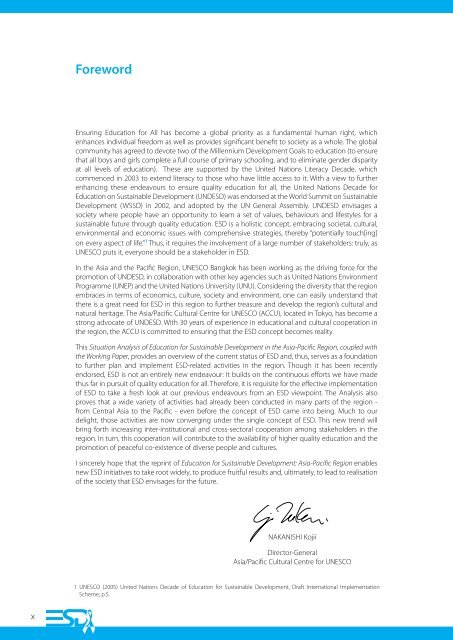A Situational Analysis - UNESCO Bangkok
A Situational Analysis - UNESCO Bangkok
A Situational Analysis - UNESCO Bangkok
You also want an ePaper? Increase the reach of your titles
YUMPU automatically turns print PDFs into web optimized ePapers that Google loves.
Foreword<br />
Ensuring Education for All has become a global priority as a fundamental human right, which<br />
enhances individual freedom as well as provides significant benefit to society as a whole. The global<br />
community has agreed to devote two of the Millennium Development Goals to education (to ensure<br />
that all boys and girls complete a full course of primary schooling, and to eliminate gender disparity<br />
at all levels of education). These are supported by the United Nations Literacy Decade, which<br />
commenced in 2003 to extend literacy to those who have little access to it. With a view to further<br />
enhancing these endeavours to ensure quality education for all, the United Nations Decade for<br />
Education on Sustainable Development (UNDESD) was endorsed at the World Summit on Sustainable<br />
Development (WSSD) in 2002, and adopted by the UN General Assembly. UNDESD envisages a<br />
society where people have an opportunity to learn a set of values, behaviours and lifestyles for a<br />
sustainable future through quality education. ESD is a holistic concept, embracing societal, cultural,<br />
environmental and economic issues with comprehensive strategies, thereby “potentially touch[ing]<br />
on every aspect of life.” 1 Thus, it requires the involvement of a large number of stakeholders: truly, as<br />
<strong>UNESCO</strong> puts it, everyone should be a stakeholder in ESD.<br />
In the Asia and the Pacific Region, <strong>UNESCO</strong> <strong>Bangkok</strong> has been working as the driving force for the<br />
promotion of UNDESD, in collaboration with other key agencies such as United Nations Environment<br />
Programme (UNEP) and the United Nations University (UNU). Considering the diversity that the region<br />
embraces in terms of economics, culture, society and environment, one can easily understand that<br />
there is a great need for ESD in this region to further treasure and develop the region’s cultural and<br />
natural heritage. The Asia/Pacific Cultural Centre for <strong>UNESCO</strong> (ACCU), located in Tokyo, has become a<br />
strong advocate of UNDESD. With 30 years of experience in educational and cultural cooperation in<br />
the region, the ACCU is committed to ensuring that the ESD concept becomes reality.<br />
This Situation <strong>Analysis</strong> of Education for Sustainable Development in the Asia-Pacific Region, coupled with<br />
the Working Paper, provides an overview of the current status of ESD and, thus, serves as a foundation<br />
to further plan and implement ESD-related activities in the region. Though it has been recently<br />
endorsed, ESD is not an entirely new endeavour: It builds on the continuous efforts we have made<br />
thus far in pursuit of quality education for all. Therefore, it is requisite for the effective implementation<br />
of ESD to take a fresh look at our previous endeavours from an ESD viewpoint. The <strong>Analysis</strong> also<br />
proves that a wide variety of activities had already been conducted in many parts of the region -<br />
from Central Asia to the Pacific - even before the concept of ESD came into being. Much to our<br />
delight, those activities are now converging under the single concept of ESD. This new trend will<br />
bring forth increasing inter-institutional and cross-sectoral cooperation among stakeholders in the<br />
region. In turn, this cooperation will contribute to the availability of higher quality education and the<br />
promotion of peaceful co-existence of diverse people and cultures.<br />
I sincerely hope that the reprint of Education for Sustainable Development: Asia-Pacific Region enables<br />
new ESD initiatives to take root widely, to produce fruitful results and, ultimately, to lead to realisation<br />
of the society that ESD envisages for the future.<br />
NAKANISHI Kojii<br />
Director-General<br />
Asia/Pacific Cultural Centre for <strong>UNESCO</strong><br />
1 <strong>UNESCO</strong> (2005) United Nations Decade of Education for Sustainable Development, Draft International Implementation<br />
Scheme, p.5.

















